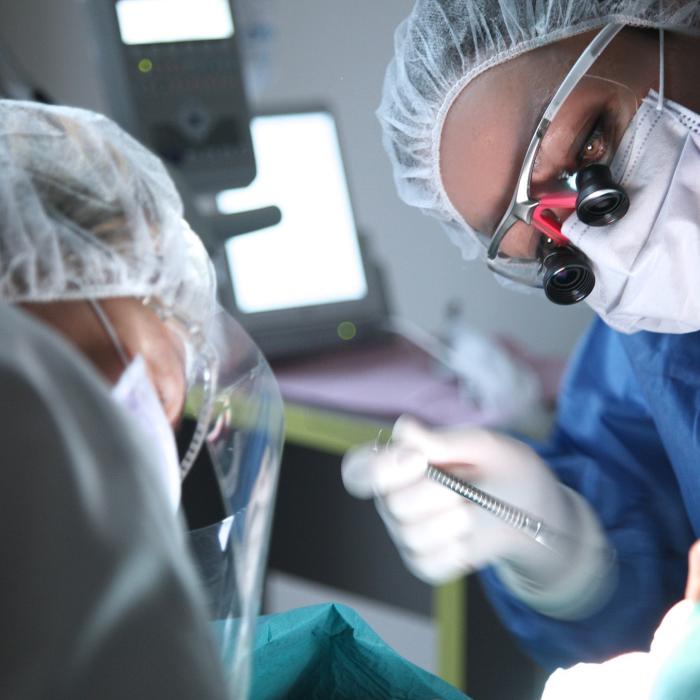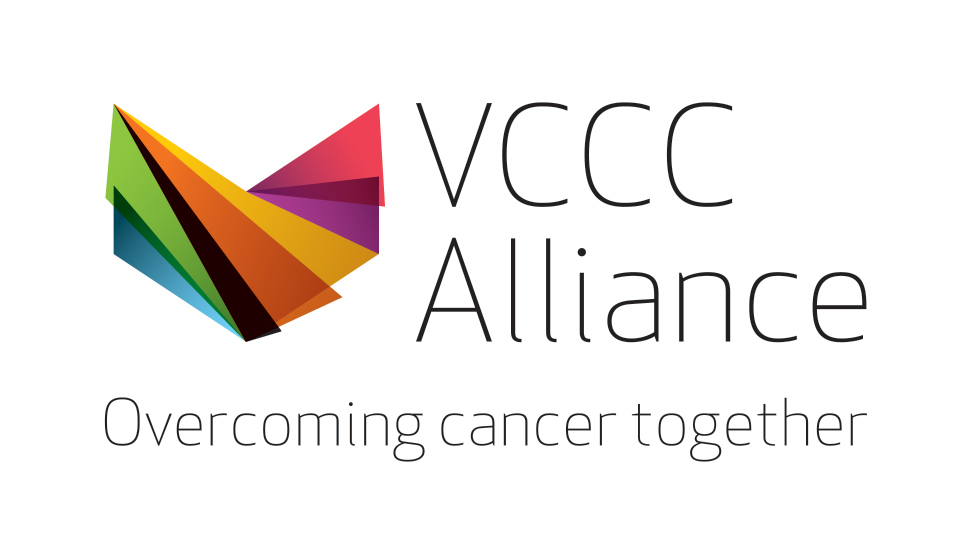Oral and Oropharyngeal Cancers: Role of Dental and Medical Practitioners
Early diagnosis, care and management
The early diagnosis, referral and treatment of patients with oral or oropharyngeal cancers can save lives. Early intervention can also improve function in areas like speech and swallowing, and increases the potential to reduce disfigurement with all its physical and psychological consequences. Surveillance for oral and oropharyngeal cancers among oral health professionals in the community is relatively low. No national screening policy or protocol exists.
Background
In 2019 The VCCC Alliance Research and Education Lead Head and Neck Cancer hosted its first oral and oropharyngeal cancer forum on 15 March 2019, convened by Associate Professor David Wiesenfeld, Research and Education Lead, Head and Neck Cancer. The aim of the forum was to promote understanding of the crucial impact of early diagnosis and the effectiveness of multidisciplinary care for patients diagnosed with these types of cancer. Twenty-three head and neck cancer specialists from the University of Melbourne, Royal Melbourne and St Vincent’s Hospitals, Peter MacCallum Cancer Centre and Austin and Western Health, and two contributors with a personal experience of oral cancer came together to share their knowledge and insights for the benefit of dental primary care professionals.
Aim: To promote understanding of the crucial impact of early diagnosis and the effectiveness of multidisciplinary care for patients diagnosed with these types of cancer.
Learning Objectives: To be aware of local therapies including Gamma Knife, and pre and post-operative radiosurgery.
Audience: Intermediate, Expert
“Community oral health professionals play a critical role in the early diagnosis, referral and management of patients with an oral or oropharyngeal cancer. We hope these resources can provide valuable information to help build knowledge and understanding of the roles of all involved in the care of patients with these cancers.” - Associate Professor David Wiesenfeld, Research and Education Lead, Head and Neck Cancer
Course Overview: Oral and Oropharyngeal Cancer Forum
Aetiology, recognition, early diagnosis and referral of oral and oropharyngeal cancer
Chair: David Wiesenfeld
Oral Cancer
Professor Michael McCullough, Professor of Oral Medicine at the Melbourne Dental School - University of Melbourne
Aim: To provide an overview of oral cancer and the importance of early recognition.
Learning Objective: Participants will have a a greater awareness of signs and symptoms of oral cancer and barriers and delays in diagnosis.
Oropharyngeal Cancer
Associate Professor Bernard Lyons, Specialist Ear, Nose & Throat, Head & Neck Surgeon - St Vincent’s Hospital Melbourne
Aim: To provide an overview of oropharyngeal cancer and explore the risk factors, epidemiology and diagnostic.
Learning Objective: Participants will have a greater awareness of common presentations of patients with oropharyngeal cancer and have further insight into the signs and symptoms.
Treatment of oral and oropharyngeal cancer
Chair: Tim Iseli
Oral cancer: The Basic Principles and Surgical Management
Dr Timothy Wong, Consultant Oral & Maxillofacial Surgeon - Royal Melbourne Hospital
Aim: To discuss the functional, psychological and aesthetic impact of oral cancer.
Learning Objective: Participants will have a greater awareness of the multidisciplinary approach to care, treatment and diagnostic options for oral cancer.
Oropharyngeal cancer: Robotic surgery, Indications, Technical aspects, Late effects
Dr Matthew Magarey, Ear, Nose and Throat (ENT), Head & Neck Surgeon - Peter MacCallum Cancer
Aim: To discuss the difficulty of accessing the oropharynx for surgical removal of cancer and explore advances in technology to improve outcomes for patients with oropharyngeal cancer.
Learning Objective: Participants will have a greater awareness of advances in technology that have that have improved surgical technique and overall functional outcomes for patients with oropharyngeal cancer.
Role of Radiation Oncology and the Extent of Radiotherapy Fields and Doses
Dr Tsien Fua, Head & Neck Radiation Oncology - Peter MacCallum Cancer Centre
Aim: To provide an overview of the role of radiotherapy and terminology in oral cancer.
Learning Objective: Participants will have a greater awareness of indications for treatment and the process of treatment and planning.
Dental management prior to oncological treatment
Chair: Jessica Prasad
Broad dental treatment planning: Critical issues with dental planning prior to cancer treatment.
Dr Sophie Beaumont, Dentist/Clinical Manager Dental Oncology - Peter MacCallum Cancer Centre.
Aim: To provide an overview of dental planning and assessment prior to and during oncological treatment
Learning Objective: Participants will have a greater awareness of timing of and urgency of appointments, barriers for patients in planning and appointments, and patient assessment prior to treatment and side effects of treatment on dental health.
Oral and oropharyngeal complications post-treatment
Radiation Oncology Impacts
Dr Mori Wada, Consultant Radiation Oncologist and the Deputy Director of Radiation Oncology - Olivia Newton John Centre. Austin Health
Aim: To discuss radiation related toxicities when treating oral/oropharyngeal cancer (acute versus late).
Learning Objective: Participants will have a greater awareness of the impact of patient related factors that affect outcomes for radiation oncology and tumour invasive damage, and surgical intervention.
Surgical Impact and Solutions
Mr Matthew Campbell, Director, ENT Head and Neck Surgical Unit - Austin Health
Aim: To provide an overview of the epidemiology of head and neck squamous cell carcinoma.
Learning Objective: Participants will have a greater awareness of common cancer causes, mortality/survival rates, site distribution as well as site specific surgical planning, treatment goals, techniques and complications.
Speech and Swallowing Impacts
Penny Chapman, Speech Pathologist - St Vincent’s Hospital Melbourne
Aim: To explore common post treatment complications and the impact on speech and swallowing in oral and oropharyngeal cancer.
Learning Objective: Participants will have a greater awareness of acute and chronic physical, functional and psychological impact of surgical treatment and the tools associated with assessing patient distress associated with treatment and complications.
Nutritional Impacts
Lisa Tran, Clinical Dietitian - The Royal Melbourne Hospital
Aim: To discuss the impact of oral and oropharyngeal cancer on nutritional status as well as other indicators for poor nutrition based on patient related factors.
Learning Objective: Participants will have a greater awareness of malnutrition rates in oral and oropharyngeal cancer, the impact of nutritional deficit on patients and explore outcomes and associated challenges post treatment.
A Patient Perspective
Lora Winter
Chair: Sophie Beaumont
Lora Winter shares her personal experience and journey of being diagnosed with head and neck cancer.
Quality of Life in Oral Cancer
Quality of Life in Oral Cancer
Dr Arun Chandu, Head of Oral & Maxillofacial Surgery - Western Health
Aim: To discuss the multiple domains of physical, functional and psychosocial issues relating to cancer diagnosis and subsequent treatment in terms of quality of life for patients.
Learning Objective: Participants will have a greater awareness of tools for measuring quality of life.
Soft Tissue Management, Xerostomia, Oral hygiene and Periodontal Considerations, Restorative management, Tooth replacement and Referral pathways.
Chair: Tami Yap
Dental Treatment Planning after Head and Neck Radiation Treatment
Dr Sophie Beaumont, Dentist/Clinical Manager Dental Oncology - Peter MacCallum Cancer Centre
Aim: To discuss dental planning after Head and Neck Cancer Radiation Treatment
Learning Objective: Participants will have a greater awareness of the importance of dental planning after radiation treatment and the oral and dental side effects.
General Dental Management Post Cancer Treatment
Dr Margaret Randles-Guzzardi, Dental Hygienist at Dental Oncology Clinic - Peter MacCallum Cancer Centre
Aim: To discuss Xerostomia and it’s management strategies
Radiation Dental Caries and Trismus,
Shae Beaton Oral Health Therapist - Peter MacCallum Cancer Centre
Aim: To discuss Radiation dental caries and Trismus, it’s prevention, management and the role of exercise therapy in managing post-radiotherapy.
Learning objective: Participants will have a greater awareness of the importance of oral hygiene, soft tissue management, xerostomia, and periodontal considerations, restorative management, tooth replacement and referral pathways.
Osteoradionecrosis: Prevention and Management
Chair: Georgina Casswell
Pathophysiology and Dose Relationships
Dr Albert Tiong, Radiation Oncologist - Peter MacCallum Cancer Centre
Aim: To define Osteoradionecrosis (ORN), the pathophysiology behind this complication and the relationship of radiotherapy dosing and ORN. Prevalence, risk factor.
Learning Objective: Participants will have a greater awareness of the prevalence and risk factor associated with Osteoradionecrosis (ORN).
Prevention and Management of Less Complex Osteoradionecrosis
Dr Hanlie Engelbrecht, Maxillofacial and Oral Surgeon - Peter MacCallum Cancer Centre
Aim: To present case studies on osteoradionecrosis.
Learning objective: Participants will have a greater awareness of osteoradionecrosis prevention, grading and management, and when to refer patients for further treatment.
Complex Management of the Advanced Case
Dr Felix Sim, Oral and Maxillofacial Surgeon - Royal Melbourne Hospital
Aim: To provide case studies that explore the complex management of advanced cases of Osteoradionecrosis.
Learning Objective: Participants will have a greater awareness of the management of advanced cases of Osteoradionecrosis.
Complex Dental Rehabilitation and the Role of the General Dental
Chair: Mike Morgan
Surgical Aspects
Dr Lisa Crighton, Oral and Maxillofacial Surgeon – Royal Melbourne Hospital
Aim: To discuss the role of the dental team in complex dental rehabilitation and surgical planning for rehabilitation and reconstruction.
Learning Objective: Participants will have a greater awareness of restoration of anatomy and function after surgical intervention and complex dental rehabilitation and reconstruction procedures with prosthetics.
Removable Prosthetics
Dr Simon Watson, Specialist Prosthodontist - Peter MacCallum Cancer Centre
Aim: To discuss what patients want in dental prosthetics to improve quality of life and prosthetics for appearance versus functional use.
Learning Objective: Participants will have a greater awareness of recommendations for dentists in the construction of dental prosthetics, and the challenges of making prosthetics post radiotherapy and surgical intervention and the maintenance of dentures, including comfort levels.
Implant Supported Protheses
Dr Peter Wilson, Coordinator Hospital Specialist Dentistry, Prosthodontis - Royal Melbourne Hospital
Aim: To discuss the important information for overall aesthetic and functional outcomes of implant supported protheses.
Learning Objective: Participants will have a greater awareness of what should be discussed with the patient to enable them to have a clear and realistic understanding of their overall aesthetic and functional outcomes.
Resource details

This course is brought to you by
